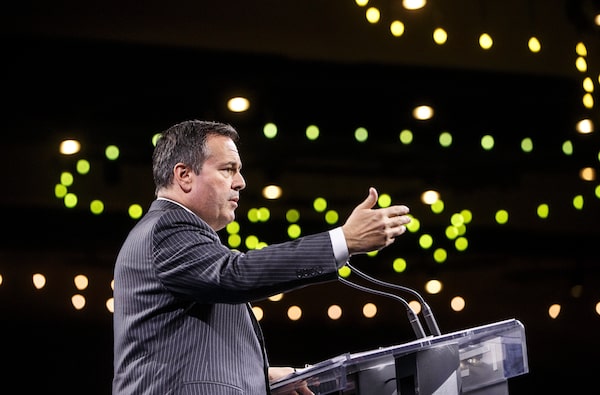
The week in Alberta-Ottawa relations started more hopefully with Mr. Kenney quietly moving closer to the federal government on one of the main issues facing the province’s leading industryJASON FRANSON/The Canadian Press
This week in Alberta ended with Encana announcing it was shifting its corporate domicile to the United States, a move the government of Premier Jason Kenney decried as symptomatic of the litany of challenges facing the province’s oil and gas sector, and which it blamed, with limited regard to the truth, on the Justin Trudeau government.
But the week in Alberta-Ottawa relations started more hopefully with Mr. Kenney, rather than demonizing the feds, quietly moving closer to them on one of the main issues facing the province’s leading industry: carbon emissions.
On Tuesday, the United Conservative Party government unveiled its climate plan. Its centrepiece is – surprise – a carbon tax. What’s more, the tax rate will be $30 a tonne, as demanded by Ottawa.
Yes, Alberta’s overall plan is weaker and narrower than what smart climate policy should look like: It covers major emitters such as power plants and the oil industry, but it exempts consumers. Nevertheless, it represents a step forward for Mr. Kenney’s government.
It’s not a complete plan. But it’s far from a complete sham.
Like many other conservatives, Mr. Kenney has spent years railing against carbon taxes. It helped his UCP win the spring election. On taking office, Mr. Kenney immediately rescinded the tax on consumers put in place by the previous New Democratic government – a symbolic gesture, since Albertans will instead soon be paying (and getting rebates from) a federal carbon tax.
As Mr. Kenney and conservatives battled carbon taxes, Canadians en masse moved toward action on climate change. A strong majority of voters in the federal election backed parties that support carbon pricing.
This is the context in which Mr. Kenney’s industrial carbon tax for Alberta marks progress. He has gone farther than he planned before he was elected Premier.
The new tax of $30 a tonne will apply to about 120 large facilities, and the rate is 50-per-cent higher than the $20 a tonne in the UCP’s election platform. On coming to power, the UCP was told by industry officials that $20 was inadequate, because it fell short of the federal $30 standard and would have invited Ottawa to step in.
Will Alberta hike its rate to $50 by 2022, as Ottawa wants? The UCP says it will consider it. Again, this is a step forward.
The new Alberta system has received particular kudos from climate experts for the way it handles emissions from electricity generation – a significant source of pollution in Alberta, because of coal power. The UCP is keeping the rules the NDP established, which offer better incentives for carbon reduction than Ottawa’s less well-designed regime.
However, Mr. Kenney’s plan for the oil sands and other large industrial operations is less impressive. It reverses improvements made by the NDP. Instead of measuring individual facilities against an industry standard, each emitter will be judged against its own past. That rewards the dirtiest operations and punishes the cleanest.
Mr. Kenney’s carbon tax is stronger than expected, but still weaker than what Alberta had in place under the NDP. The proof is in the dollars. Over the three fiscal years from 2020-21 through 2022-23, Mr. Kenney’s carbon tax is expected to bring in $1.35-billion. That’s $700-million less than what the NDP’s industrial carbon strategy would have produced.
The previous NDP government also expected to raise $1.2-billion this year from the broader-economy carbon tax that the UCP killed.
The UCP’s ambivalent commitment to taking on climate change is also clear in its plans for the carbon-tax revenues. The cash is supposed to be invested in technology – but more than a third of it could be used to reduce the deficit and promote the oil industry. (In contrast, nearly all federal carbon-tax revenues will be returned to Alberta taxpayers.)
Alberta’s carbon plan could have been better, but it also could have been far worse. Despite long-standing conservative intransigence on carbon pricing, Mr. Kenney has made a concession to the reality of climate science, and politics.
For the government of Alberta, call it one step forward, one foot firmly planted in place.
Because even as Mr. Kenney quietly imposes his carbon tax on industry, he can keep up his very public opposition to any such tax on consumers – secure in the knowledge that Ottawa will act to fill the gap.